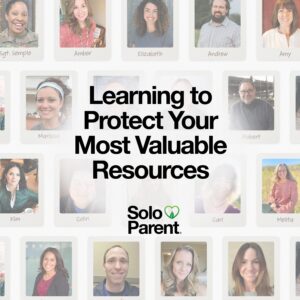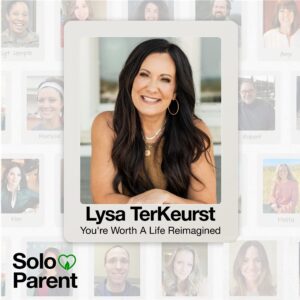Have you ever looked at your life through the lens of your past—your failures, regrets, or painful moments—and thought, “I’ll never measure up”?
So many solo parents live in that tension. One moment you feel proud of the work you’ve done to rebuild, and the next, a small trigger drags you back to the old narrative: you’re too broken, too far gone, or just not enough.
This episode is a deep dive into that struggle, the cracked mirrors we stare into every day that distort our worth and keep us stuck. Together with Amber Fuller, a counselor with a Masters in Marriage and Family Therapy (MMFT), we explore what it looks like to move past those false reflections and live from the steady, unshakable truth of who we really are.
Key Insights from This Episode:
- Cracked mirrors distort how we see our worth
- Perspective shifts help us see ourselves through truth, not shame
- Living from worth changes how we show up for ourselves and our kids
Cracked mirrors distort how we see our worth
Amber describes “cracked mirrors” as the false reflections that shape how we see ourselves, voices from the past, failures, or unmet expectations that make us believe we’re unworthy. “These cracked mirrors inform our sense of worth,” she says. “We absorb them as truth even when they’re not.”
For single parents, those mirrors are everywhere: the replay of a failed marriage, the guilt of not being able to fill both parenting roles, the comparison to intact families. As Elizabeth shared, “Every day I can feel like I’m doing great, and then one small thing pulls me right back down into feeling unworthy.”
These mirrors convince us that our value depends on performance or perfection, leaving little space for grace or humanity. But as Amber reminds us, being in touch with our limits and imperfections is actually what leads us toward healing. “Being connected to our true self, our human self, is the antidote,” she says.
Perspective shifts help us see ourselves through truth, not shame
One of the most powerful parts of this episode is the conversation about shifting perspective. It’s easy to fixate on what went wrong, to believe that our past determines our future. But healing starts when we interpret our story differently.
Elizabeth reflected on how reframing her past changed everything. Instead of seeing a failed relationship as proof that she’s unlovable, she now sees it as a teacher: “It taught me about boundaries, about courage, and about what I actually do want in a healthy connection.”
Amber adds, “When we look back, we have to learn to hold onto the good too. There were hard things, but there were beautiful lessons in there too.”
Robert shared how this plays out in parenting: “Worth isn’t something you earn, it’s something you accept. My tendency has always been to think that love or approval comes from what I do. But that’s not where worth comes from.”
These shifts aren’t instant, but they create new ground to stand on. They help us move from shame to curiosity, from self-criticism to compassion.
Living from worth changes how we show up for ourselves and our kids
Once we begin to recognize our worth, the next step is to live like it’s true. That means catching ourselves when old lies start playing in the background.
Amber offered a simple practice: “Name the lie out loud. When you say it, you separate yourself from it, it becomes external, not your identity.”
She also distinguishes between ego and worth. Ego says, I am what I produce. Worth says, I’m valuable before I ever do a thing. When we live from ego, we burn out trying to prove our value. But when we live from worth, we find peace in being human, imperfect but whole.
Elizabeth reflected on how this plays out in everyday life. “When my list of things to fix about myself gets too long, that’s my cue to pause,” she said. “I’m learning to thank the strategies that helped me survive but also to grieve them, to let go of what I don’t need anymore.”
Amber encouraged listeners to start collecting “new evidence” for their worth: “Notice the small things that are true about who you are, the ways you show up with love, the things you’ve learned, the quiet ways you keep going.”
Even something as simple as resting, she says, can be an act of worth. “I used to feel guilty about taking a nap, but it’s actually restorative. It’s saying, ‘I’m worth caring for too.’”
Robert laughed in agreement. “That’s a hard one for me. But it’s true. When I guilt myself out of rest, I’m saying I’m not worth it.”
Living from worth takes practice. It’s not about fixing ourselves, it’s about remembering who we already are.
Listener Question
“How do I discipline my kids effectively without feeling guilty that they’ve already been through enough?”
Robert’s answer was simple: “Start framing discipline as investment. You’re not just correcting, you’re helping them learn. Yes, they’ve been through a lot, but resilience doesn’t grow in comfort. It grows through challenges.”
Elizabeth shared her own example with her son: “He was getting zeroes in class, and I could have punished him out of fear. But instead, I decided to teach him about responsibility—how to manage time, follow through, and see consequences. It was about helping him grow, not controlling him.”
Amber added, “Our kids are worth the extra effort. Permissiveness isn’t love. They’ve already been through a lot, which is exactly why intentional parenting matters so much. When we show up thoughtfully, we model self-worth for them too.”
Stay Connected + Get Support
We want to answer any Solo Parent questions you may have. Submit your listener questions HERE.
Additional Resources:




